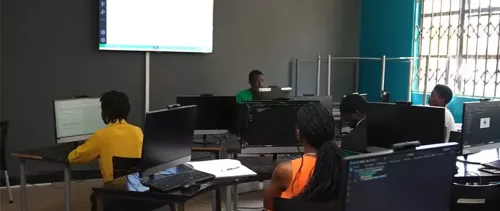
The Digital Economy for Africa (#DE4A) initiative supports the emergence of a vibrant, inclusive and safe digital economy. Photo: © Dominic Chavez/IFC
Over the past 18 months, the World Bank Group has implemented an ambitious umbrella initiative to connect the African continent to broadband by 2030 and leverage digital tools for economic transformation, creating better jobs for more people.
We could not have known how critical access to digital technologies was about to become before the advent of the global pandemic. But in its wake, we are stepping up our commitment to support Africa’s digital transformation.
The Digital Economy for Africa (#DE4A) initiative was launched in 2019 in support of the "African Union’s Digital Transformation Strategy." Since then, diagnostic reports have been conducted for 35 countries. These diagnostics provide snapshots of each country’s digital economy, examining five digital economy pillars (infrastructure, public platforms, financial services, businesses and skills), while managing the risks associated with digital transformation. The data from these evidence-based diagnostics inform current projects and potential future initiatives.
As of summer 2021, 149 World Bank projects are active in 34 African countries to support the emergence of a vibrant, inclusive and safe digital economy. The projects are diverse and robust and help to narrow the digital divide through electronic identification and banking, mobile money services, family support, training, and mentoring through digital hubs and universities.
[embed]https://www.youtube.com/watch?v=KPczf2G0uXg[/embed]
Too many Africans cannot access the technology they need for school, work, health, or financial services. The pandemic has underscored the vulnerability of the digitally excluded who have a harder time accessing vital information , including health education and e-commerce.
A 2020 World Bank and GSMA study demonstrated the positive impact of mobile broadband on welfare and poverty reduction in Africa , using data from Nigeria, the largest mobile market on the continent. The percentage of households below the extreme poverty line drops by about 4 percentage points after one year of mobile broadband coverage, and about 7 percentage points after two or more years, in large part due to increased participation in the labor force during that time. Broadband infrastructure is a key driver of jobs and productivity, especially in rural and remote areas.
The development of digital technology accelerates socioeconomic development. It also connects their citizens to many more services and opportunities. Data and digital innovation are transforming the way governments operate, increasing transparency and service delivery. Thanks to digital technologies, more people — no matter their income level or where they live — can access unprecedented amounts of information, take online jobs, enroll in e-courses, and receive life-saving care through telemedicine. Mobile money is providing an easy and secure alternative to the traditional banking system while increasing financial inclusion.
Yet the pandemic increased the challenges for those who lack the access, opportunity or skills to operate in the digital world. Seven million university students in Africa could not continue their education in 2020 due to closures during lockdowns. The crisis also underscored emerging risks around privacy and cybersecurity, emphasizing the importance of promoting a safe, secure digital transformation.
As a response, countries have scaled up efforts toward universal broadband access. Through our work under the Digital Economy for Africa initiative, we are committed to helping countries increase bandwidth and manage congestion; ensure the continuity of critical public services; prevent and mitigate cyber risks; and power financial technologies as demand for services such as health care, mobile payments, food delivery, and e-commerce increase. We are developing robust regional and country action plans with tailored measures to increase access and adoption of digital tools.
Digital technologies cut across many areas and require a variety of sectors to work together, including collaboration and partnerships between public and private players. At the World Bank, we are stepping up to this challenge. We look forward to collaborations that will help eradicate the digital divide, expand and strengthen connectivity and promote positive change across societies and economies.


